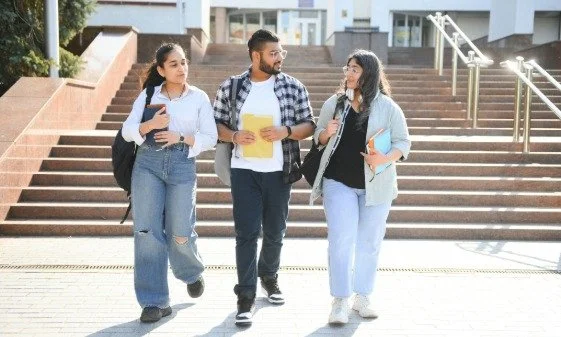University in Delhi Expels Bangladeshi Scholar, Harming India’s Academic Culture
South Asian University’s Action Follows Row Over Fish Served on Festival Day
August 31, 2025
South Asian University in New Delhi expelled a Bangladeshi Ph.D. scholar, Sudeepto Das, following an incident involving food restrictions on the Mahashivratri festival. The university’s decision involves far-reaching institutional failure and indicates a shift that will harm India’s academic and civic culture.
According to university records reviewed by Scroll.in, Das was expelled on July 15 for “serious misconduct” related to a scuffle in the students’ mess in February. The conflict stemmed from objections by Akhil Bharatiya Vidyarthi Parishad (ABVP) members to the serving of fish curry, which they claimed violated Hindu religious sentiments. Das intervened after the group attempted to throw away food. The group also allegedly intimidated the mess secretary.
Das was quoted saying that the group of students, allegedly affiliated with ABVP and Rashtriya Swayamsevak Sangh (RSS), forcibly entered the mess hall and confronted the staff. There was no prior directive from the university administration to suspend non-vegetarian meals on that day. The group allegedly surrounded and assaulted mess secretary Yashada Sawant, prompting Das to step in. He claims he was physically attacked by the group after pushing one of the aggressors aside.
Video evidence reportedly supports Das’s account, according to Scroll.in. Sawant also stated she was sexually harassed during the incident and had filed a complaint against one of the accused, Ratan Singh, but the university failed to act on it. Instead, the administration punished Das and fined Sawant.
The ABVP welcomed the decision, characterising the clash as a conspiracy by “Left-aligned” students.
Das, a Hindu from Bangladesh, has studied in India since 2009. He was in the final stage of his Ph.D. in economics at South Asian University, which is intended to encourage regional cooperation through academic exchange.
The incident shows how majoritarian power is being allowed to grow inside academic spaces. The university applied its rules in a selective way, judging the student more by who he is than by what actually happened. Das’s identity as a Bangladeshi seems to have worked against him, quietly removing the protection and fairness the university is meant to provide. His expulsion looks less like a fair punishment and more like a message that the university sides with powerful ideological groups.
By ignoring the sexual harassment complaint and punishing the woman who filed it along with the student who defended her, the university has shown that those with influence will not be held accountable. This weakens the basic rules meant to ensure fairness and allows aggressive groups to dictate what is acceptable in common spaces.
Food restrictions during religious festivals are deeply personal and vary widely, but in this case, one group tried to force its own beliefs on everyone else. The university’s silence gives cover to this behaviour, treating it as legitimate under the label of cultural protection. This appears to be a form of symbolic violence. Symbolic violence is a term used in sociology to describe harm that happens through silence, rules or everyday practices that seem normal, but actually support unfair power. It is not physical violence. Instead, it happens when institutions or people quietly allow one group to control or silence others, often by making their actions seem acceptable or by ignoring injustice.
Although the immediate target was a foreign student, the consequences will remain with India and Indians. The university has weakened its own legitimacy by choosing ideology over procedural fairness. Future Indian students who resist mob assertion or defend minority rights can expect the same structural abandonment. It is Indian citizens who will suffer more in the long run, as public institutions become less open to free expression, disagreement, or support for others.
This incident sets a dangerous example for how future cases may be handled. Expelling a student while ignoring the violence by others sends the message that being part of academic life in India now depends on staying silent and accepting dominant political views. This turns universities from places of open debate into spaces where students are watched and pressured to conform. Over time, this will reduce the range of ideas, make people afraid to speak freely, and create a sense of distrust among both students and teachers.
This decision also affects the region. South Asian University was meant to bring together scholars from SAARC (South Asian Association for Regional Cooperation) countries. That very purpose is at risk. If the university seems unsafe or biased, students from neighbouring countries may stop coming. This will harm regional goodwill and reduce India’s influence in academic and diplomatic circles.
The growing acceptance of majoritarian threats on campuses will slowly but deeply damage India’s democratic culture. If political bullying is allowed to continue without consequences, it will start to seem officially approved. This will weaken constitutional protections, not just for minorities and foreigners, but for any citizen who does not fit the dominant cultural norms.
You have just read a News Briefing by Newsreel Asia, written to cut through the noise and present a single story for the day that matters to you. Certain briefings, based on media reports, seek to keep readers informed about events across India, others offer a perspective rooted in humanitarian concerns and some provide our own exclusive reporting. We encourage you to read the News Briefing each day. Our objective is to help you become not just an informed citizen, but an engaged and responsible one.

